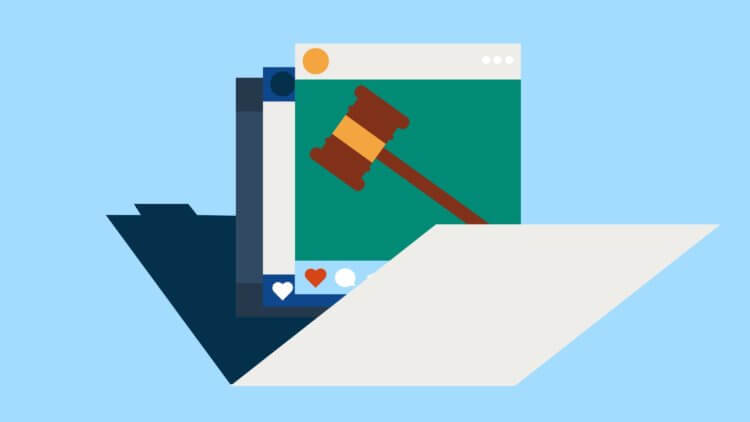Business cards are essential for law firm marketing. The most effective business card designs for attorneys aren’t just about color palettes and card stock. In addition to featuring great design and layout, law firm business cards also need to recognize an attorney’s ethical responsibilities. However, when done and used right, a business card can be a powerful way to strengthen your networking efforts—and to connect with future clients.
If you’re a lawyer thinking of investing in business cards, you need to consider a few key factors. Read on to learn more about how attorneys can use business cards to their advantage—and what ethical concerns you should consider. We’ll also cover the key details to include to help you stand out from other firms and encourage potential clients to get in touch.

Why attorneys need business cards
You may be asking, “Do lawyers need business cards?” Yes—for attorneys, business cards are a simple but effective part of a larger marketing plan.
It’s true that today’s online-driven world calls for law firms to use digital marketing strategies like law firm websites and social media. Still, having a tangible way to convey your key professional details is still a valuable way to solidify impressions and connect. This is where business card designs for attorneys come in.
When designed and distributed with ethics in mind (more on that later in this post), a law firm business card can:
- Instantly tell potential clients who you are. You can make a big impression on a small piece of paper. In addition to conveying the obvious (like your name), you can use a business card to introduce—or reinforce—your professional brand and indicate what you do. For example, you can state your legal practice area.
- Make it easy for clients to find you when they need you. Whether a client looks at your card to see where your office is located or uses it to look you up online later, a business card makes it easy for clients to seek you out when they need your legal services. A business card can drive potential customers to your other marketing initiatives and ultimately hire your legal services.
Do lawyers use business cards?
Today’s lawyers do use business cards as part of a larger marketing strategy. Law firm business cards are a valuable way to leave a lasting impression on colleagues and potential clients. Still, lawyers must design and distribute them with specific ethical responsibilities in mind.
The ethics of business cards
Before you print up any law firm business cards, it’s important to learn the ethics of legal business cards. The exact rules for lawyer business cards vary depending on where your practice is located. But in general, think of business cards for lawyers in a similar context as lawyer advertising. Essentially, lawyers need to take care to abide by the specific rules in their jurisdiction.
In general, however, ethical considerations for lawyer business cards may include:
- Be honest and straightforward. Make sure all information on your card is straightforward, true, and accurate so you won’t inadvertently mislead or confuse potential clients.
- Be careful what you call yourself. As outlined by ABA Rule 7.2, you need to label yourself honestly and precisely. If you imply that you are an expert or specialist in any legal practice area, you need to be clearly certified as one, and you need to be permitted to say so on communication material in your jurisdiction.
- Be exact with your name and identifying details. In most cases, you should use the exact name under which you’re licensed to practice law. Some jurisdictions (for example, New York) also have rules for whether law firms can use trade names.
- Avoid using superlatives. Don’t write anything that can’t be substantiated as fact on your business card, and avoid using superlatives (such as “the best” or “the cheapest”) altogether.
- Include any requirements. To stay ethically compliant, check if you need to include any specific language or disclaimers on your lawyer business card.
- Be clear about your office location. If you’re working outside of the jurisdiction where you are licensed to practice law (for example, if you’re working remotely), be careful not to inadvertently mislead clients. As outlined in ABA Formal Opinion 495, a lawyer should not include a local address (for a jurisdiction where they are not licensed) on a business card when working outside of their jurisdiction. Similarly, if you have a virtual law firm, be careful not to mislead clients into thinking you have a physical office by putting an address on your lawyer business card.
- Be careful about business cards for non-lawyer staff. For example, when you’re creating any business cards for non-lawyers, like a business card for a paralegal to use for networking, make sure the person’s position at the firm is clear. Make clear distinctions between lawyer and nonlawyer staff.
To create an effective business card and stay compliant with the rules, you should consult your jurisdiction for the state-level specifics for lawyer business cards.
Can a lawyer leave business cards anywhere?
In addition to considering what you can ethically put on your business card, you should also consider where and when you can leave your business card as an attorney. You may want to have a business card on hand to give to a colleague at a networking event or a potential client who asks you for your card. However, it’s important to beware of situations where leaving a business card could violate your ethical obligations (check the rules for your jurisdiction for the specifics that apply to you).
In general, however, don’t distribute your business cards to strangers who haven’t asked for one. Also, be careful to avoid using your card to directly solicit your services (for more about the rules regarding Solicitation of Clients, see ABA Rule 7.3).
Business card designs for attorneys—5 details to include
Balance is key to effective business card designs for attorneys: You want to make your card readable and visually pleasing while including the details that convey who you are, what you do, and how to reach you, including:
Your law firm’s logo
Consistent branding is powerful, and your law firm’s logo is an effective way to quickly and visually represent your firm’s professional image. So, showcase your brand on your business card.
Learn more about effective law firm logo designs.
Your tagline
If you have a short tagline, consider including it on your business card. A catchy tagline can further your brand messaging to prospective clients. A few caveats, however:
- Keep it concise. A lengthy tagline that takes up a full side of your business card could make someone less likely to read or remember it.
- Keep it professional. Your legal business card represents your business—so stay on brand and avoid insulting your competition or using unprofessional language.
- Stay away from superlatives. When creating a brief tagline, it can be tempting to turn to superlatives for emphasis. However, be careful to avoid using any superlatives that cannot be factually substantiated. For example, a tagline like “The best divorce lawyer in the world” would not be ethically compliant.

Contact information
This may seem obvious, but it’s worth calling out: If your business card doesn’t include a way to reach you, it won’t be effective. The goal is to make it easy for clients to reach you. While you should check the rules for what’s allowed in your area, you’ll likely want to include:
- Your name (make sure it’s the same name you’re licensed under, to avoid ethical issues).
- The business phone number.
- Your law firm’s office address.
- Email address.
- The law firm website (make sure your website doesn’t include anything that could be construed as an ethical violation. For example, listing your website as something like”www.theverybestlawyerinthewholeworld.com” could be construed as implying that you’re the best lawyer in the world—which is impossible to prove.).
Similarly, if applicable, you may also want to include details like your jurisdiction and/or practice area to make it clear to potential clients where you are licensed to practice law, and if you are in the right practice area for them.
Firm name
While it isn’t part of your contact information, including your law firm’s name (if it’s not already a clear part of your logo) is just as important. Including your firm name helps enhance your professionalism and credibility while also enhancing the branding on your business card.
Call to action
While it’s less common for business card designs for attorneys to include a call to action, using an action word can help motivate potential clients to reach out and set your card apart from the competition.
For instance, instead of simply listing an email address ([email protected]), you could include “Reach out for your estate law needs—[email protected].” Or you could include a QR code to direct people to your website.
Learn more about how to use calls to action in your marketing to help get more legal clients.

You may like these posts
Business card designs for attorneys—example
This business card features a clean, simple design with all the essential information on one side, with the logo taking center stage on the other.
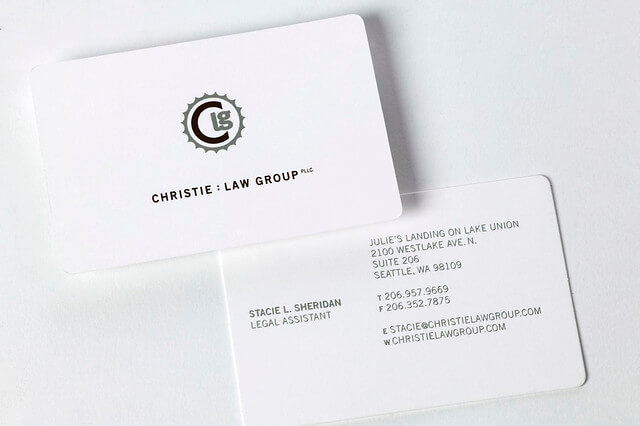
With lots of white space and an interesting combination of portrait and landscape formats on each side, this business card is simple yet eye-catching.
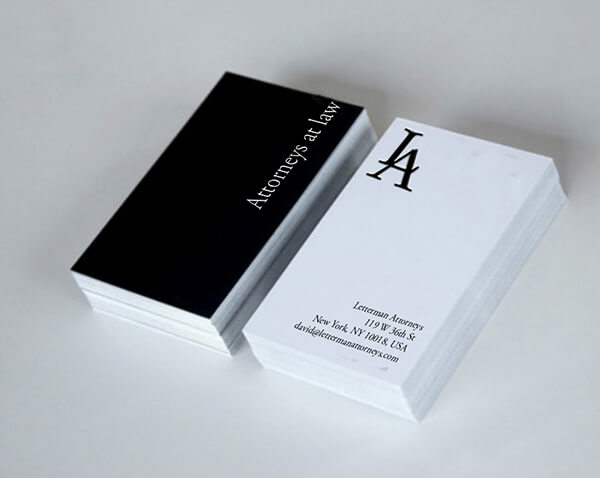
This business card includes all the critical information on one side, while the law firm logo front and center on the other.
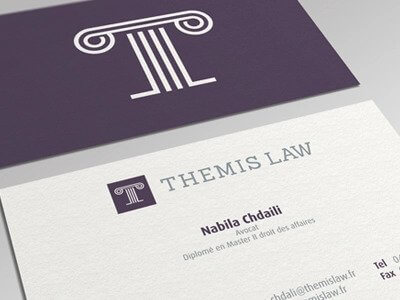
We love the bold background on one of the sides. They’ve also included a QR code, which is a great and efficient way to encourage people to visit your website. The QR code also signals to potential clients that you’re a tech-savvy law firm, and likely to offer more flexible and convenient legal services.
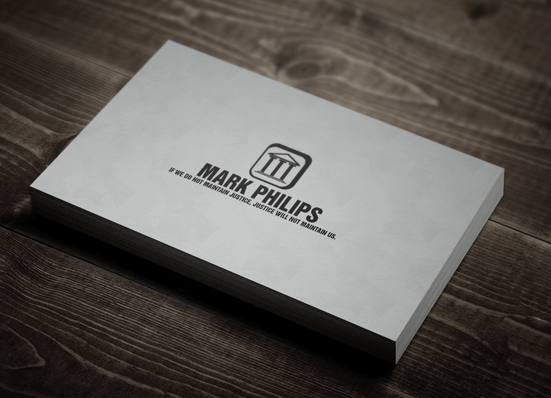
The vertical layout helps this business card stand out from its competitors. It doesn’t hurt that the design is clean and crisp, with great use of white space.
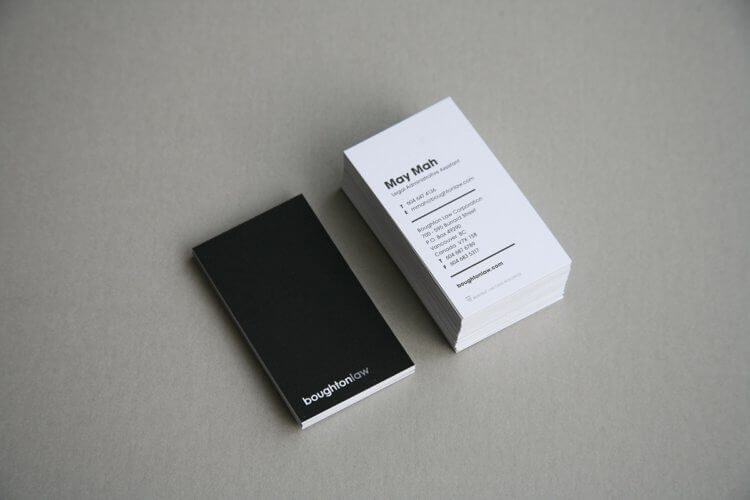
Final thoughts
Business cards may be old school, but they’re also classic for a reason: They’re an effective tool when making professional connections, even for attorneys.
While it’s important to first learn and follow any ethical rules for law firm business cards, lawyers can—and should—use business cards as a way to connect with clients and network effectively.
The best business card designs for attorneys are thoughtfully created to capture the recipient’s attention and convey key information. A simple piece of paper serves as a valuable tool to communicate and connect attorneys with clients.
We published this blog post in November 2021. Last updated: .
Categorized in: Business






